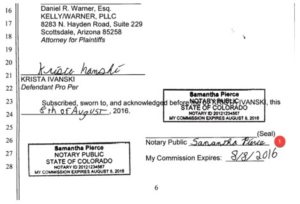That’s what Scottsdale’s Kelly/Warner has allegedly been up to—particularly on cases that pertain to content on mainstream media sites, which Google is always hesitant to de-index.
According to Volokh, it works like this: “They (a) sue the people quoted in the articles, (b) get stipulations from the people recanting their allegations, (c) get court orders based on those recantations and then (d) try to use those court orders to deindex an entire article.”
The firm has used similar methods on recent cases like Chinnock v. Ivanski and Lynd v. Hood, even going so far as to use fake notaries—in addition to fake defendants—on the court filings. Kelly/Warner has even filed defamation claims to have reviews of its own attorneys removed from the web in the same fashion.

It’s unclear whether Welter knows the extent to which Kelly/Warner has bent the law in their—and her—favor, and she may even be unaware of the tactics the firm is using to clear her name. Still, the questionable tactics are obvious throughout her filing, with former boyfriend McMahon recanting his statements and dozens of media outlets listed on the injunction.
Silencing the Media
While the legal tactics of Kelly/Warner are certainly worrisome, the bigger issue is what it means for online media. The firm’s short-cut methods toward censorship not only eliminate the court’s ability to judge on libelous content, but they also shortchange a media organization’s ability to review, revise or recant its stories independently—a long-held power that ensures reporters do due diligence in their coverage.









